Trump Helps Ohio Candidate Opposing Iran Deal Win Senate Primary

J.D. Vance, an opponent of the Iran nuclear deal and a candidate endorsed by former president Donald Trump has won the Republican Senate nomination in Ohio.

J.D. Vance, an opponent of the Iran nuclear deal and a candidate endorsed by former president Donald Trump has won the Republican Senate nomination in Ohio.
Vance gained an advantage in mid-April in a crowded field of candidates, when Trump endorsed him and propelled him to the top spot, in a sign of the former president’s political fortunes in upcoming primaries in other states.
In the run up to the primary vote, Vance criticized President Joe Biden’s“obsession with re-entering the disastrous Obama Iran deal,” and said, “One of the President Trump's best foreign policy decisions was getting out of that deal, and we need to fight Biden hard on this.“
Entering indirect talks with Iran to revive the 2015 nuclear agreement, known as JCPOA, was one of the first foreign policy initiatives of the Biden administration. After 13 months of talks an agreement remains elusive as Iran demands the removal of its Revolutionary Guard from the US list of terrorist organizations.
Opoosition to the talks and to the revivial of the JCPOA have increased in the past two months, with almost all Republicans in the Senate and some Democrats telling the administration not to make concessions to Tehran.
Vance will battle Democratic Rep, Tim Ryan in the November elections, who easily won his party’s primary, but will face a difficult fight in Republican-leaning Ohio.
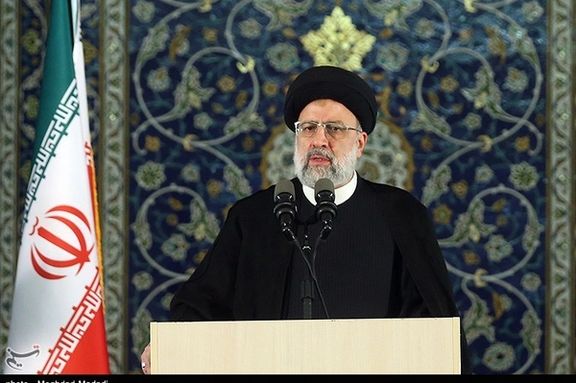
Iranian President Ebrahim Raisi has called for the return of Tehran-Kuwait relations to "their true capacities" by having more reciprocal visits and meetings.
Raisi made the remarks in a phone call with the emir of Kuwait, Sheikh Nawaf Al-Ahmad Al-Jaber Al-Sabah on Tuesday night.
Increasing the reciprocal visits can help enhance the level of bilateral cooperation, making use of the existing capacities at more operational levels, he told Kuwait’s emir.
Raisi described Kuwait’s stances on regional “conspiracies” as “wise”, expressing hope that the two neighbors can elevate their ties. Islamic Republic officials use the term ‘conspiracy’ to describe the influence of the United States and Israel.
The two countries are in a row over the Arash/al-Durra natural gas reserves in the Persian Gulf near the demarcation line of their territorial waters, with Kuwait saying the disputed gas field is “exclusively owned” to the small coastal nation and its neighbor Saudi Arabia.
Iran “is not part of the gas field” and is not a party to development projects related to it, Foreign Minister Sheikh Ahmad Nasser al-Mohammad al-Sabah said in March.
The head of Iran-Kuwait Joint Chamber of Commerce in Tehran said late in 2021 that Kuwait has stopped issuing visas for Iranian businesspeople.
Hani Feysali added trade ties between the two countries have dropped drastically, duo to Iran’s weak diplomacy, saying bilateral trade has been recording a downward trend in recent years as its total volume fell from $400 million in 2020 to $18 million last year.
During the fifth US-Kuwait Strategic Dialogue in Washington, DC in January, US Secretary of State Antony J. Blinken and Foreign Minister al-Sabah warned of threats posed by Iran to the stability of the region, reaffirming a shared commitment to promoting security and peace.

The death sentence of a Swedish-Iranian scientist jailed in Iran will be carried out in the next two weeks, ISNA news agency in Tehran reported on Wednesday.
The text published by ISNA is in quotation marks, meaning that someone else provided the wording. It says that Djalali, was found guilty of “espionage for the Zionist regime” and his death sentence has now been confirmed by the Supreme Court.
Ahmadreza Djalali (Jalali) was arrested when he accepted an invitation by a university to visit Iran in 2016. Authorities accused the researcher of espionage – a charge they often use against foreigners and dual nationals that they want to hold as a bargaining chip. Later, Djalali was sentenced to death as Iran tried to ramp up pressure on European countries to free individuals arrested for terrorist activities or on violations of human rights.
The ISNA text also refers to one of these individuals, Hamid Nouri, who was on trial in Swedenuntil this week, saying that his arrest was meant to put pressure on Iran to release Djalali.
Sweden arrested Nouri, now 61, upon his arrival in Sweden at Stockholm Airport in 2019 and in August 2021put him on trial over the mass execution and torture of political prisoners at Gohardasht Prison in Iran in July and August 1988.
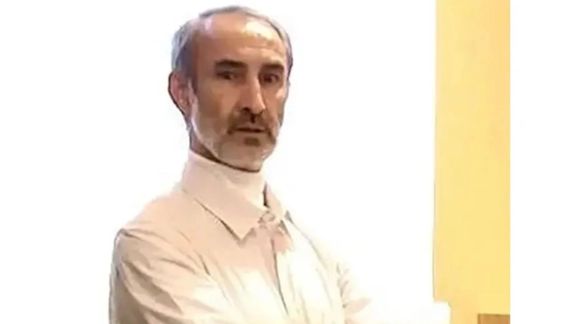
Most of victims were linked to the opposition group Mujahedin-e Khalq Organization (MEK) but there were also some with links to leftist and secular groups.
Nouri is the first person ever put on trial for the executions carried out on the basis of a fatwa by Iran's then-supreme leader, Ayatollah Ruhollah Khomeini.
Swedish prosecutors who produced dozens of witnesses against Nouri, have demanded life imprisonment for him. The last session of his trial ended this week and a verdict will be announced in July. The news about Djalali’s impending execution coincides with the conclusion of Nouri’s trial.
Iran has a 43-year history of taking foreigners hostage to put pressure on European countries and the United States, either for financial reasons or to secure the release of individuals arrested in the West for illegal activities benefitting the Islamic Republic. On many occasions, prisoner swaps have taken place. Djalali’s case seems to be one of those instances when Tehran wants to use him to free Nouri or get a reduced sentence for him in exchange for not executing Djalali.
The ISNA text also alleges without any evidence that Nouri was arrested in Sweden at the behest of Israel to secure the release of “its spy”, Djalali.
The Swedish Iranian detainee has insisted he is innocent and was forced to confess to espionage under torture. His health has deteriorated in long months of solitary confinement, torture and assaults by prison guards.
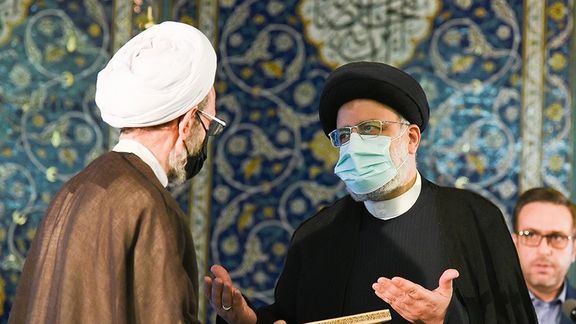
As food prices continue to rise in Iran prompting general anger, Tehran’s conservative prayer Imam on Tuesday had to acknowledge that people want solutions.
While Conservative President Ebrahim Raisi took office last August, claiming to be able to quickly control inflation, price rises have accelerated in the past 8 months. Attempts by him and his supporters to blame his predecessor for the crisis increasingly sound hollow. Even many conservatives and regime loyalists have begun asking for solutions.
Prices for essential food itams such as sugar, oil, flour, bread and pasta have dramatically increased in the past few weeks.
"Last year, the average price for each kilogram of pulses was between 500,000 and 750,000 rials (or $2 to $3),” said Abdi Eftekhari, secretary of Iran’s Pulses Union. He put current prices 70 to 120 percent higher.
Eftekhari noted a rise in global inflation due mainly to the Russia-Ukraine conflict, given the two countries’ role as major exporters of agricultural produce, including wheat.
The head of the directing board of Iran’s Pasta Factories Association, Mehrdad Nouri, recently said that 70 percent of the cost of producing pasta depended on the cost of flour. Recent years, he explained, had seen a decline in Iran’s cultivation of durum wheat − also called pasta wheat or macaroni wheat − from which semolina flour is made, even though private producers have encouraged farmers by paying above the government-approved rate.
But the main reason for soaring prices is an economy in crisis, with ballooning liquidity, above 40-percent inflation, and a government unwilling to make a nuclear deal with the United States to lift criplling sanctions.
Hoarded vegetable oil
Abolhassan Khalili, chairman of Iran's Vegetable Oil Trade Union, has attributed the rising price of vegetable oil to both the Ukraine crisis and hoarding by producers and brokers expecting further price hikes. Raw vegetable oil, which is imported, has risen 60 percent due to the Ukraine crisis, Khalili said.
First vice-President Mohammad Mokhber said Monday that the government’s elimination of a lower dollar rate for essential food imports had led to price rises for some items, although there was “abundance of basic goods in the country.” He said prices had risen 70 percent globally, apparently referring to the Ukraine crisis. Officials have generally claimed Iran has adequate stores of sugar, oil and other necessities.
Consumer price inflation in Iran has been above 30 percent since the United States imposed ‘maximum pressure’ sanctions in 2018. But food prices have risen faster, with government figures showing 60 percent year-on-year inflation in 2021.
Rice price
In an interview with ILNA published Sunday, Shahriar Haydari, a member of the parliament's National Security and Foreign Policy Committee, claimed high inflation was not due to international factors but to a lack of integrated management. “The increase in the price of eggs, yogurt, buttermilk and meat has nothing to do with the United States and sanctions,” he said.
Prices for most essential goods are nominally fixed by the government, but the private sector often disregards the guidelines. In recent months, prices for rice, the main staple, have fluctuated widely, but are now 1,000,000 rials (about $4) per kilogram, enough for a meal for five to eight people. The average salary, according to the Ministry of Labor, is the equivalent of $150 a month.
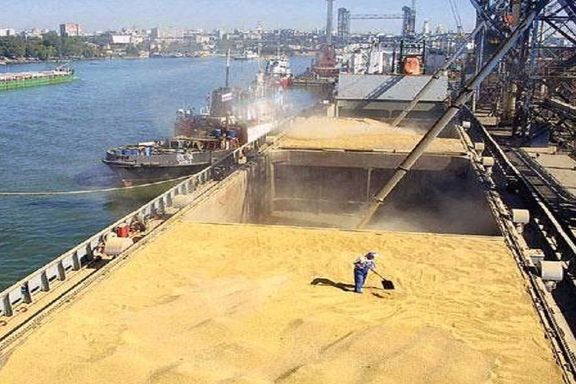
The head of the Flour Producers Association says this year Iran must import 20 million tons of grain, noting that the country has never been so dependent on imports.
Mohammad-Reza Mortazavi said on Monday that grain imports will include 6 to 7 million tons of wheat, as Iranian state media rejected rumors on Tuesday that bread prices will increase following the elimination of subsidies.
According to data by Iran’s Ports and Maritime Organization grain imports stood at 16.5 million tons last year, about half of which was wheat while the rest were barley, corn and rice.
Referring to a five-fold increase in flour prices by the Agriculture Ministry, was expected, but “it would be better if the government first examined its effect on prices of other commodities”. Pasta prices officially increased as much as threefold on Monday.
He added that most of the country's wheat imports this year will come from “Russia or the Baltic states and even Europe”, highlighting that the Russian invasion of Ukraine has led to a global rise in wheat prices as well as almost all other agricultural produce. Ukraine and Russia account for more than a quarter of global wheat exports and nearly a fifth of corn.
In March, Nour News, affiliated with the secretary of Iran's Supreme National Security Council (SNSC), Ali Shamkhani, reported that Iran has signed a deal with Russia to import 20 million tons of basic goods, including vegetable oil, wheat, barley and corn.
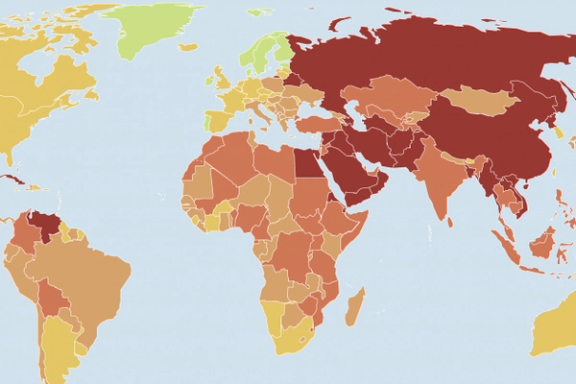
The 20th World Press Freedom Index by Reporters Without Borders (RSF) has put Iran at the rock bottom of the list, only better than Eritrea and North Korea.
Iran has ranked 178th out of 180 countries in the table, which is four places worse compared with the previous report published in 2021. In the 2022 index, even Turkmenistan, Myanmar and China rank better than the Islamic Republic.
The RSF calling 2021 for Iran “another tough year for press freedom” as “the two main leaders accused of abuses and crimes committed against journalists for 30 years, Ebrahim Raisi and Gholam Hossein Mohseni-Ejei, became, respectively, president of the republic and head of the Iranian judicial system. The result: an increase in arbitrary arrests and convictions, and journalists imprisoned and denied medical care”
Reza Moini, head of RSF's Iran-Afghanistan desk, told Radio Farda on Tuesday, "Unfortunately, this year Iran has reached the point where we call it the hell gate countries”.
Iran has jailed hundreds of journalists, writers and bloggers in the past three decades, accusing many of endangering national security for expressing their opinions. Some have died in prison, such as Baktash Abtin who died under custody on January 8, after being denied timely medical care for Covid-19.
The Index is a snapshot of the level of press freedom enjoyed by journalists and media during the calendar year (January-December) prior to its publication but when the press freedom situation changes dramatically in a country between the end of the year assessed and publication, the data is updated to take account of the most recent events, such as a major attack on journalists, or the sudden introduction of an extreme repressive policy.
Iran also has restricted access to internet for more than two decades, with thousands of websites blocked. Access is also blocked to major social media networks such as Facebook and You Tube.
Mohammaed Mosaed, a persecuted Iranian journalist who won the 2020 press freedom award of the US-based Committee to Protest Journalists told the award ceremony last year “Telling the truth in Iran is a crime.”
"Speaking the truth is dangerous in my country because the government fears not only the truth itself but also the audacity behind telling the truth and this has turned speaking the truth into a crime in my country," he said.
Mosaed was jailed had received a four-year sentence when he exposed corruption in the government.
The RSF called on the United Nations last week to take swift action to ensure Iran followed “international human rights law” over the treatment of jailed journalists.
Press freedom is defined by the RSF as “the ability of journalists as individuals and collectives to select, produce, and disseminate news in the public interest independent of political, economic, legal, and social interference and in the absence of threats to their physical and mental safety.”